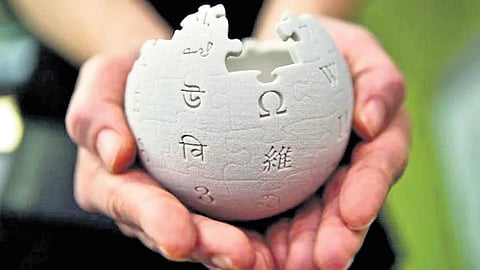

Humans have an innate right not only to acquire information but also to contribute to its creation. People fulfil their natural function as rational, social beings by engaging in meaningful pursuits and exercising their intellect through contributions to communal knowledge. The basic essence of human intellectual freedom would encompass not only the right to obtain, assimilate and regurgitate information provided but also the vital right to generate and contribute to it.
However, throughout history, the flow of information has not always been from the bottom up, but more like a trickle-down. Information has been carefully distributed under close control by institutions, governments, intellectual elites, media conglomerates, and censorship. These institutions have been gatekeepers, selectively choosing which viewpoints are important, even while they have been vital in the preservation and dissemination of knowledge.
People and communities, for their part, have often discovered ways to share their stories and produce information in their own ways outside institutional limitations. From the times of Socrates and the Greek agora, where citizens gathered to share and debate ideas, and those of Adi Shankaracharya and his theological debates to those of French cafés, we have always cultivated and shared knowledge as a community.
Pertinently, the foundation of this right is Article 19(1)(a) of the Constitution, which guarantees freedom of speech and expression. Its broad interpretation by the Supreme Court repeatedly maintained that it includes not only the right to speak but also the right to know, be informed, and—most importantly—take part in discourse. It is evident that this guarantee includes the right to contribute to collective knowledge when we consider this in the context of contemporary knowledge generation.
Another important pillar is the Preamble’s commitment to ensure “liberty of thought, expression, belief, faith, and worship”. The moral imperative for recognising this becomes even clearer when we consider its denial. When we treat knowledge as something to be received rather than collaboratively created, we perpetuate what Miranda Fricker describes as “epistemic injustice”—the systematic exclusion of groups from production of knowledge.
On the other hand, when individuals are empowered to contribute to human knowledge, we approach what Jürgen Habermas termed the ‘ideal speech situation’, wherein truth arises from free and equitable debate governed by basic, implied rules rather than authority. Obviously, this democratisation of knowledge raises questions about truth, authority and collective responsibility, especially in the time of modern internet.
The internet—and particularly websites like Wikipedia, Project Galactic Guide, Fanlore and Nupedia—has presented the radical proposition that knowledge generation and curation needs to be free and readily available, apart from being communal.
The emergence of such platforms challenges the paternalistic view of knowledge that has functioned on an underlying moral presumption: information needs conscientious guardians. The platforms’ basic tenet—anybody can easily create and edit—represents a shift in attitude towards knowledge creation. Now everyone has a right to participate in the development of knowledge as well as quickly access it.
Let us consider the implications of Wikipedia’s editing process. During the discussion on an article’s substance, contributors engage in free and equitable debate, wherein the truth emerges not from authority but dialogue among equals. The ‘talk’ sections further serve as a virtual agora, where arguments and evidence rather than credentials or prestige determine the truth. This embodies a grounded perspective on the human potential, suggesting ordinary individuals can engage in intellectual discussions and reach reliable conclusions when provided with appropriate materials.
But, as the Delhi High Court has sought to recently probe in the proceedings initiated by Asian News International, can platforms such as Wikipedia be considered encyclopaedias? It is true that unlike the common view that asserts people act out of self-interest, this model goes against that idea. When thousands of people gather to spend countless hours improving articles for no monetary consideration, they exhibit a behaviour hard for standard models to explain. This democratic approach to knowledge creation may encounter criticism from individuals who argue it undermines truth in favour of popular sentiment.
Critics frequently cite Wikipedia’s susceptibility to prejudice and misuse as evidence that it fails to meet encyclopaedic criteria. This fails to consider the prompt resolution associated with such issues. While absolute truth is unattainable, Wikipedia’s criteria for neutrality and verifiability suggest a more nuanced stance, asserting we might achieve something closer to truth through comprehensive documentation and reasoned discourse.
Its approach reminds us of the Royal Society’s motto ‘Nullius in verba’—take nobody’s word for it. The motto suggests the validity of truth assertions should be assessed based on intrinsic merit than origin. Bringing this notion to the creation of encyclopaedias transforms it from an ideal into practical methodology. Regardless of source, every fact is subject to verification and every assertion can be scrutinised.
Look at how the venerable Encyclopaedia Britannica worked: a small group of experts wrote authoritative treatises that would not change until the next edition came out. This seemed like the only way to assure accuracy—till it was turned on its head by Wikipedia and its cohort.
(Views are personal)
Sriram Venkatavaradan, Saai Sudharsan Sathiyamoorthy
Advocates, Madras High Court